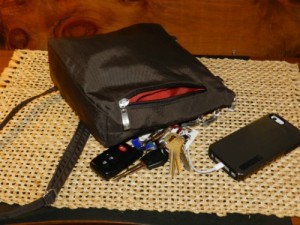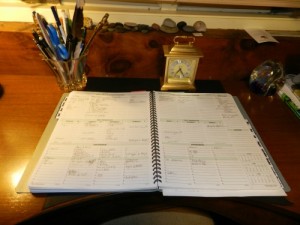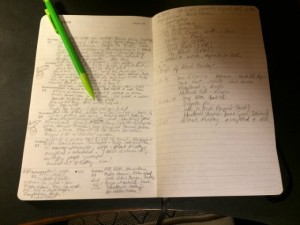
If I’m lucky, I might still have a third of my life left in the tank, so I’m annoyed that I squander so much of this time searching for my keys. Whenever I can’t find them, I have painfully memories of laughing at my mother, whose every sortie from wherever she was started with a hunt for her handbag. I was sure this would never happen to me, but if it’s not my keys that are MIA, it’s my wallet or phone. If only I kept the three together, I could just call them up – unless I forgot to charge the phone.
My mother died of complications of vascular dementia, one of the many types of Old Timers’ Disease of which Alzheimer’s is the most famous. She was a tall, slender woman who was disappointed I inherited my dad’s sturdy frame. But luck of the draw, my dad’s in good health as he turns ninety; I’m starting to think short and stout may have some advantages if they come with a longer-lived brain. But I’m not taking any chances, and I’m doing what I can to remain sharp.

First off, there are the usual, boring, good health habits that at least don’t ruin memory by polluting the brain. I haven’t used tobacco since I lived in England in my early twenties, where I spent Tuesday nights at the pub with my rock climbing friends, rehashing the last weekend’s climb and planning the next. I smoked in self-defense: everyone smoked, so I inhaled.
It turns out that both alcohol and tobacco can contribute to short-term memory loss, along with some medications, untreated depression, and blows to the head. I quit smoking not long after I started, I drink in moderation, and I try to refrain from hitting myself in the head when I can’t find the damn keys.
Short term memory loss is when you forget what happens between when you arrive home and want to leave again, anywhere from a few minutes to a few days, during which time the location of the keys can fall off the list of the five to nine items the brain is capable of holding on to for the short term. Long-term memory can hold more, so I’m developing new strategies for keeping track of my keys.
It helps that I have one of those magical car keys that just has to be on me to unlock the doors and allow the engine to start, so I never take the keys out of my handbag.

Because I always have more than five to nine things to remember, I make constant use of that external hard drive commonly known as a smart phone. It remembers what I can’t – if I can find it – so it stays in my handbag as well. And I always place my handbag in the same place every time I walk into the house, right next to the phone charger.
I figure if I do this enough, the location of my keys will migrate from my faulty short term memory to my more reliable long-term one, where the details of my childhood remain vivid, while the insect physiology I supposedly learned in this morning’s lecture has already vaporized, just like the pheromones bugs disperse into the air to communicate.
So far, my system is working – at least in regard to my keys. But there’s no question that the anomia (difficulty recalling words) and Senior Moments (forgetting why I’ve walked into the bedroom in the middle of the day), are part of my middle age. I live with it, and I find ways to cope.

It turns out that old people often retain their social graces even after their memory goes. It helps to have developed social graces beforehand, so I’m working on them. More realistically, I’m developing other strategies, along the lines of keeping track of my keys, including using a planner that I refer to daily, so I know what I have to do and where I have to be.

I also keep a diary in which I record my professional activity, from drafts written, articles submitted, invoices sent, emails exchanged and phone conversations about work-related activities, like business miles and other handy data when it comes to quantifying the year for the IRS.
And then, I try to walk for an hour a day, and I have a dog to remind me, lest I forget. Study after study suggests that exercise is the single most important element of good health for both brain and body. For me, it’s a spiritual thing: I feel renewed after an hour walking out of doors.
Finally, there’s the “use it or lose it” element of brain health, so I keep learning new things, including – incredibly – how to Tweet. While I still don’t see the point of this particular social media platform, I’m nevertheless challenging myself to use it both as a way to exercise my brain and to stave off becoming a Fuddy-duddy, where a person decides they’re simply too old to learn a new trick. Yes, there’s a hipster element involved, but Twitter points me to interesting articles and blogs I probably wouldn’t otherwise see, and it’s one thing to keep abreast of the ever-changing landscape of cyberspace and a completely other thing to behave like someone in the flush of youth. Been there, done that, and am now happily engaged in figuring out the pitfalls and pleasures of Middle Age.
Luskin’s award winning novel, Into the Wilderness, is a love story between people in their mid-sixties. Life starts in middle age.
I love this post. I’m now a snowbird and will soon return back to Vermont. It’s interesting being in a whole new environment where people I meet have no idea of how I used to be. This anomia business is, of all the deficits, the most annoying to me. I used to pride myself on being a wordsmith (and a great speller) but alas, that is slipping from my beleaguered brain. The car keys, wallet and phone trio are a PITA but I carry cash, and a credit card with me in my pocket. If I can’t find the trio I go to yesterdays pants et voila.It is good to know that I’m not alone as I approach 70.
Hi Annette, How nice to hear from you! Thanks for reading my blog. And no, you’re not alone: The Baby-Boom generation is growing gray and forgetful. But I have to ask, What’s PITA (aside from a mid-Eastern flatbread)? Let me know when you’re back in Vermont and I’ll come visit. DLL
PITA=Pain in the A$$
Duh. I knew that; I just forgot!